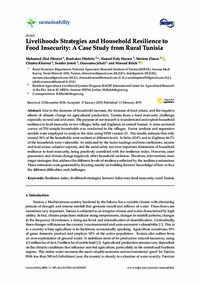Livelihoods Strategies and Household Resilience to Food Insecurity: A Case Study from Rural Tunisia

Authors:
Due to the decrease of household incomes, the increase of food prices, and the negative effects of climate change on agricultural production, Tunisia faces a food insecurity challenge, especially in rural and arid areas. The purpose of our research is to understand and explore household resilience to food insecurity in two villages, Selta and Zoghmar, in central Tunisia. A cross-sectional survey of 250 sample households was conducted in the villages. Factor analysis and regression models were employed to analyze the data using SPSS version 21. The results indicate that only around 36% of the households were resilient at different levels. In Selta, 62.8% and in Zoghmar 66.7% of the households were vulnerable. As indicated by the factor loadings and beta coefficients, income and food access, adaptive capacity, and the social safety net were important dimensions of household resilience to food insecurity, being positively correlated with the resilience index. However, asset possession, and climate change negatively affect household resilience. Therefore, interventions must target strategies that address the different levels of resilience reflected by the resilience estimators. These estimators were generated by focusing mainly on building farmers’ knowledge of how to face the different difficulties and challenges.
